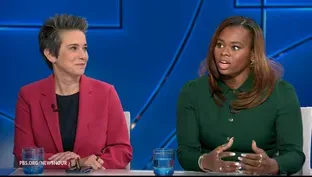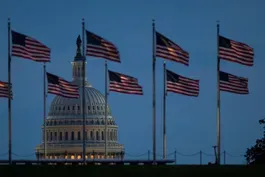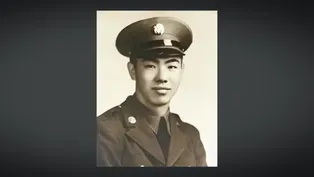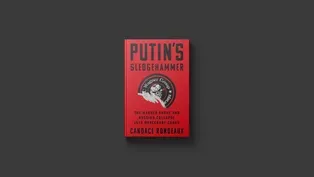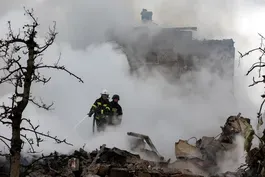
Catholic Relief Services faces uncertain future after cuts
Clip: 5/26/2025 | 6m 45sVideo has Closed Captions
Catholic Relief Services faces uncertain future after Trump cuts aid funding
One of the first major policy decisions of the second Trump administration was a significant change in spending on foreign aid. That eventually included effectively dissolving the U.S. Agency for International Development, the primary organization that distributed those funds. Deema Zein reports on how one major recipient of USAID funding is grappling with the impact.
Problems with Closed Captions? Closed Captioning Feedback
Problems with Closed Captions? Closed Captioning Feedback
Major corporate funding for the PBS News Hour is provided by BDO, BNSF, Consumer Cellular, American Cruise Lines, and Raymond James. Funding for the PBS NewsHour Weekend is provided by...

Catholic Relief Services faces uncertain future after cuts
Clip: 5/26/2025 | 6m 45sVideo has Closed Captions
One of the first major policy decisions of the second Trump administration was a significant change in spending on foreign aid. That eventually included effectively dissolving the U.S. Agency for International Development, the primary organization that distributed those funds. Deema Zein reports on how one major recipient of USAID funding is grappling with the impact.
Problems with Closed Captions? Closed Captioning Feedback
How to Watch PBS News Hour
PBS News Hour is available to stream on pbs.org and the free PBS App, available on iPhone, Apple TV, Android TV, Android smartphones, Amazon Fire TV, Amazon Fire Tablet, Roku, Samsung Smart TV, and Vizio.
Providing Support for PBS.org
Learn Moreabout PBS online sponsorshipLAURA BARRON-LOPEZ: One of the first major policy changes of the second Trump administration was a significant cut to foreign aid.
That eventually included effectively dissolving the U.S. Agency for International Development, or USAID, the primary organization that distributed funding for aid across the globe.
Deema Zein reports on how one major recipient of USAID funding is grappling with the impact.
DEEMA ZEIN: On a rural hillside in Southwest Honduras, farmer Isidro Lopez (ph) is installing his own water delivery system.
Drip irrigation linked to this reservoir allows Lopez to support his family year-round in this drought-stricken region.
But the work of farmers like him is now on hold.
JULIO CESAR COLL, Asomaincupaco (through translator): The impact of the halt in USAID funding is really tremendous.
We have lost projects that guarantee food security for families who can't otherwise put food on the table.
DEEMA ZEIN: Julio Cesar Coll runs Asomaincupaco, the organization supporting Lopez's work.
JULIO CESAR COLL (through translator): These are communities in which poverty will increase.
These are communities where young people are going to lose opportunities or end up living in an eternal cycle of poverty and most probably end up immigrating.
DEEMA ZEIN: It's just one of more than 1,000 local partners that work with international humanitarian agency Catholic Relief Services, or CRS.
Today, the organization works in over 120 countries with both faith-based and secular nonprofits.
CRS was one of the largest recipients of USAID funding, which made up nearly two-thirds of its total budget.
That money was used to distribute lifesaving food aid, prevent the spread of infectious disease, and run community development programs.
SEAN CALLAHAN, President and CEO, Catholic Relief Services: The shock to the system right now with the massive level of the cuts is unprecedented in the time that I have been working.
DEEMA ZEIN: Sean Callahan is the group's CEO and says their local partners were also shocked.
SEAN CALLAHAN: Wow, this is a real shame.
Why are they doing it?
They also said, if the U.S. doesn't want migrants, why would you stop investing here so that people can -- so it seemed a little counterintuitive to many of the local people.
DEEMA ZEIN: And the funding cuts impacted both long- and short-term programs.
SEAN CALLAHAN: We had over 130,000 metric tons of American food sitting in warehouses overseas, and we couldn't distribute it.
Vaccines, polio vaccines for kids, we had them in the clinic.
We couldn't give them out.
Treatment for HIV and AIDS, at first, some of that was frozen, so we can't give antiviral therapy to a mother or a child.
DONALD TRUMP, President of the United States: USAID is really corrupt.
I'll tell you, it's corrupt.
DEEMA ZEIN: By February, the Trump administration had largely shut down USAID and later suspended billions of dollars in foreign aid contracts.
Secretary of State Marco Rubio said -- quote - - "Lifesaving programs could continue," but many of those programs have been canceled.
In a statement to the "News Hour" a State Department spokesperson said: "U.S. foreign assistance will be transformed into a short-term, targeted and transactional force that fiercely prioritizes America's interests.
Ensuring we have the right mix of programs requires an agile approach.
We will continue to make changes as needed."
CHARLES KENNY, Center for Global Development: I think the best evidence that USAID works is how quickly people started dying when it went away.
DEEMA ZEIN: Charles Kenny is a senior fellow at the Center for Global Development.
CHARLES KENNY: We also know that U.S. assistance gets where it's meant to get to because we track it really carefully.
That's not to say there's no fraud and there's no abuse in the system.
And there certainly have been failed aid programs over time.
But the portfolio, if you look at the record as a whole, of U.S. assistance for this fraction of a percentage of the federal budget, I think it shows a massive success.
DEEMA ZEIN: In 2023, the U.S. government spent about 70 billion on foreign aid, or just about 1 percent of the federal budget.
But now, Kenny says, the longstanding relationships that aid organizations like CRS formed with local partners will suffer, organizations like the Justice, Development and Peace Initiative in Northeast Nigeria.
In 2017, with CRS support, the group expanded their scope to emergency humanitarian work as a response to civilians fleeing militant group Boko Haram.
REV.
VINCENT OKOYE, Executive Director, Justice, Development and Peace Initiative: I actually fear for the future because it would mean that all the gains with the humanitarian interventions and the targeted programs, if they are not sustained, we will lose all that progress, and I'm afraid of what it will lead to.
DEEMA ZEIN: Father Vincent Okoye is the initiative's executive director.
REV.
VINCENT OKOYE: If people do not have food to eat, they are going to die.
If those children who are malnourished are not able to get the nutritious supplements that they need to help them to recover, we will lose lives.
And so it's actually a matter of life and death.
DEEMA ZEIN: And the administration's decision, Charles Kenny says, will be hard to reverse.
CHARLES KENNY: It's not just, OK, Congress decides that we need to refinance, we do need to fund education programs worldwide.
There won't be the people there who know how to run a USAID program in those areas.
We're going to have to start from scratch.
And that -- I hope that the funding is resumed in full tomorrow, but, even if it were, this damage is permanent.
DEEMA ZEIN: And one that Callahan says runs counter to American values.
SEAN CALLAHAN: We can build fences and build borders and reinforce it.
I prefer that we build bridges.
That's what a great nation is, is someone who shows the generosity in spirit they have.
It's not someone who says, I'm only going to help my family.
DEEMA ZEIN: What's your biggest fear for CRS and for all these communities that you have been helping?
SEAN CALLAHAN: That people will start feeling that Americans don't care anymore, that we have stopped caring for other people.
That puts us in a very weakened position around the world.
The American ethos will be lost and it will take many, many years to build that up.
We have earned this reputation over many, many years.
It'd be a shame if we destroyed it in a very few number of months.
DEEMA ZEIN: For the "PBS News Hour," I'm Deema Zein.
Amy Walter and Jasmine Wright on Trump's big bill
Video has Closed Captions
Clip: 5/26/2025 | 11m 12s | Amy Walter and Jasmine Wright on how Senate Republicans feel about Trump's big bill (11m 12s)
How young Democrats are pushing to redefine the party
Video has Closed Captions
Clip: 5/26/2025 | 3m 20s | How young Democratic candidates are pushing to redefine the party's future (3m 20s)
Japanese American WWII vet built bridges between cultures
Video has Closed Captions
Clip: 5/26/2025 | 8m 50s | Japanese American veteran built bridges between cultures after WWII (8m 50s)
News Wrap: Driver plows into crowd of people in Liverpool
Video has Closed Captions
Clip: 5/26/2025 | 6m 39s | News Wrap: Driver plows into crowd of fans celebrating Liverpool FC championship (6m 39s)
'Putin's Sledgehammer' reveals how Wagner Group gained power
Video has Closed Captions
Clip: 5/26/2025 | 9m 19s | 'Putin's Sledgehammer' reveals how the Wagner Group became so powerful it threatened him (9m 19s)
Russia escalates drone attacks on Ukraine
Video has Closed Captions
Clip: 5/26/2025 | 10m 2s | Russia escalates assault on Ukraine with massive drone attacks on cities (10m 2s)
Providing Support for PBS.org
Learn Moreabout PBS online sponsorshipSupport for PBS provided by:
Major corporate funding for the PBS News Hour is provided by BDO, BNSF, Consumer Cellular, American Cruise Lines, and Raymond James. Funding for the PBS NewsHour Weekend is provided by...
